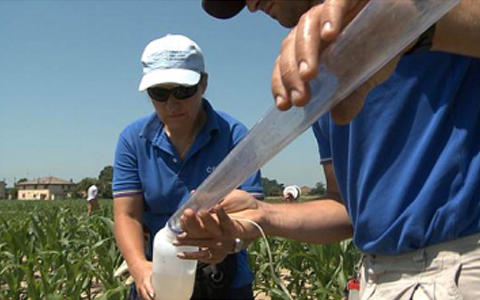Helping farms produce more crops with less water
Background
Project acronym: FIGARO
Sustainable water management on farms is vital to maximize food production. Is it possible – in agriculture – to produce more with less water? That’s the aim of a European research project taking place in Bologna, Italy.

By 2030 almost 80 percent of water extracted from the ground will be used for irrigation which is likely to contribute to a global water crisis. Agronomist Adrian Battilani, who is the scientific coordinator of the Figaro project told Euro news how they plan to maximize water efficiency.
“With this project we give farmers all kinds of data to create a highly precise water management system. When we say highly precise we mean that we’ll be able to better manage water, irrigation, the use of water and fertilizer together and the whole agricultural process,” said Battilani.
The challenge is to create a system able to analyze the complexities of any single field, or crop; a tool that enables farmers to make the right decisions at the right time. Domenico Solimando, who also works on the project said: “A sensor measures the amount of humidity in the soil over time. Knowing the exact quantity of water present in the soil is very important. It allows us to identify precisely at which moment to intervene and to know the amount of water necessary.”
But to get high precision irrigation in the field, the team goes back to the lab to experiment with a humidity-control system in the soil. “We check several things with the samples we bring back from the land. First, we get data checking the moisture content in the soil over time. Then from other samples, we can analyze what other matter is in the ground,” said Agronomist Gioele Chiari. The land where the tests take place is crossed by a network of pipes, with small perforations close to the roots of the plants. For each set of pipes, it is possible to set variable parameters to avoid giving excess water to the crops. And the management of all of this is easier than you may think.
Farmers are able to manage the flow of water directed to any single plant, simply by using a tablet connected to the internet.
The heart of the project is a digital platform that processes data from the sensor networks on the land and from weather satellites, to ensure optimal water management.
Scientists believe the technology will allow another agricultural shift to take place, moving from just the production of food to producing biomass. “Biomass will allow the agriculture industry to create new chemicals from plants for industry, reducing the need for fossil fuels like oil,” said Agronomist Adriano Battilani. “In a few years the tomato will be the secondary part of production.
The new biomass chemicals will be more profitable than vegetables. So, agriculture is set to double its productivity, on one hand it will allow us to extract a ketone or phytochemical that can be used as fuel and on the other, it will produce fruit I can eat,” he added.
This innovation was made possible by Israel’s continued participation in the official Horizon 2020 fund, managed in Israel by ISERD part of The Israel Innovation Authority (Formerly the Office of the Chief Scientist and MATIMOP). The initiative has taken Israeli R&D to the next level with the help of ground-breaking collaboration between scientists in Israel and Europe, as well as essential funding and support.
Project details
Project acronym: FIGARO
Participants: Israel (Coordinator), Spain, Netherlands, Denmark, Portugal, UK, Italy, Greece
Project Reference N° 311903
Total cost: €8 036 698
EU contribution: €5 999 987
Duration: October 2012 – September 2016
